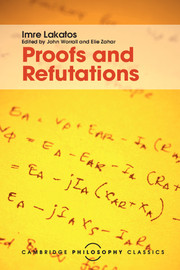Book contents
Chapter 2
Published online by Cambridge University Press: 05 November 2015
Summary
Editors’ introduction
Poincare's proof of the Descartes–Euler conjecture is referred to above. In his doctoral thesis Lakatos introduced detailed consideration of this proof by a discussion of the arguments for and against the ‘Euclidean’ approach to mathematics. Parts of this discussion were incorporated by Lakatos into chapter 1 (see, e.g., pp. 53–60) and others were rewritten as parts of ‘Infinite Regress and the Foundations of Mathematics’ (Lakatos [1962]). We therefore omit this introductory discussion here.
The advocate of the Euclidean programme – the attempt to supply mathematics with indubitably true axioms couched in perfectly clear terms – has been Epsilon. Epsilon's philosophy is challenged, but the Teacher remarks that the most obvious and direct way to challenge Epsilon is to ask him to produce a proof of the Descartes–Euler conjecture which satisfies Euclidean standards. Epsilon takes up the challenge.
Translation of the conjecture into the ‘perfectly known’ terms of vector algebra. The problem of translation
epsilon: I accept the challenge. I shall prove that all simply-connected polyhedra with simply-connected faces are Eulerian.
teacher: Yes, I stated this theorem in a previous lesson.
epsilon: As I have pointed out, I first have to find the truth in order to prove it. Now I have nothing against using your method of proofs and refutations as a method of discovering the truth, but where you stop, I start. Where you stop improving, I start proving.
alpha: But this long theorem is full of stretchable concepts. I do not think we shall find it difficult to refute it.
epsilon: You will find it impossible to refute it. I shall pin down the meaning of each single term.
teacher: Go on.
epsilon: First I shall use only the clearest possible concepts. Maybe sometime we shall be able to extend our perfect knowledge to cover optical cameras, paper and scissors, rubber balls and pumps, but now we should forget these things. Finality certainly cannot be reached by using all these various tools. Our previous failures, in my view, are rooted in the fact that we used methods which are alien to the simple, naked nature of polyhedra.
- Type
- Chapter
- Information
- Proofs and RefutationsThe Logic of Mathematical Discovery, pp. 112 - 134Publisher: Cambridge University PressPrint publication year: 2015



